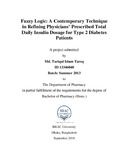| dc.contributor.advisor | Rahman, Saif Shahriar | |
| dc.contributor.author | Tareq, Md. Tariqul Islam | |
| dc.date.accessioned | 2019-01-02T10:01:10Z | |
| dc.date.available | 2019-01-02T10:01:10Z | |
| dc.date.copyright | 2018 | |
| dc.date.issued | 2018-09 | |
| dc.identifier.other | ID 13346040 | |
| dc.identifier.uri | http://hdl.handle.net/10361/11072 | |
| dc.description | This project report is submitted in partial fulfilment of the requirements for the degree of Bachelor of Pharmacy, 2018. | en_US |
| dc.description | Catalogued from PDF version of project report. | |
| dc.description | Includes bibliographical references (page 36-42). | |
| dc.description.abstract | Type 2 diabetes mellitus (T2DM) is one of the major global health challenges across the world
with an elevated prevalence rate worldwide and responsible for 90-95% of total diabetes cases.
The management of T2DM depends on conventional insulin therapy that does not have the
ability to perfectly provide accurate glucose regulation inside the body. In a conventional insulin
therapy, physicians prescribe insulin dosage for the patients by taking into account patientrelated
factors (PRFs) i.e. weight, height, BMI or carbohydrate intake discretely or considering
only one factor. The succession of insulin dosage depends on the close consideration of all the
factors that have a positive correlation with the insulin sensitivity. Thus traditional insulin
therapy, in turn, causes instances of hypoglycemia and hyperglycemia among the vast number of
diabetes patients. This project examined 24 randomly selected T2DM patients admitted into two
hospitals of Dhaka city through utilization of a fuzzy logic based technique to further tune the
physicians’ prescribed total daily insulin dosage for alleviating the hypoglycemic and
hyperglycemic incidences among these patients. Two patient-related factors (PRFs) such asaverage
fasting blood glucose level (AFBGL) and average daily protein intake (ADPI) were
considered as inputs for the fuzzy-logic system as these two PRFs have a positive correlation
with insulin sensitivity. After considering insulin dose as an output variable, appropriate
membership functions were defined by using MATLAB Fuzzy Logic Designer Toolbox.
Furthermore, to establish a relationship among the membership functions, the ‘if/then rules’ are
then set in the interface that also provides the fuzzy system with a decision-making facility. The
last process known as defuzzification has enlightened the project by generating an output known
to as predicted insulin dose (PID) as a recommendation by the fuzzy-based system for each
patient. Through a quantitative comparison between the predicted insulin dose (PID) by the
fuzzy system with the physicians’ prescribed insulin dose (PPD) for every patient, a numerical
difference of different degrees was obtained indicating an additional or reduced administration of
insulin dose by the patient so far causing the critical events (hyperglycemia & hypoglycemia)
more prominent in their everyday life. The result of this experiment is further evinced by the data
collected from those two hospitals where the experimented patients were admitted. Our
experimental findings have shown a number of previous hyperglycemic and hypoglycemic
events experienced by the patients as predicted by the fuzzy system respectively. Accordingly, the predicted insulin dose by the fuzzy system is believed to alleviate the hypoglycemic and
hyperglycemic events in these patients in the future. Finally, a low mortality rate and a beneficial
financial condition followed by a better quality of life for these 24 type 2 diabetes mellitus
(T2DM) patients were possible by utilizing this prominent form of Artificial Intelligence used
for precision dosing on insulin. | en_US |
| dc.description.statementofresponsibility | Md. Tariqul Islam Tareq | |
| dc.format.extent | 42 pages | |
| dc.language.iso | en | en_US |
| dc.publisher | BRAC University | en_US |
| dc.rights | BRAC University project reports are protected by copyright. They may be viewed from this source for any purpose, but reproduction or distribution in any format is prohibited without written permission. | |
| dc.subject | Fuzzy logic | en_US |
| dc.subject | Diabetes treatment | en_US |
| dc.subject | Insulin | en_US |
| dc.subject.lcsh | Diabetes--Treatment--Bangladesh. | |
| dc.title | Fuzzy logic: a contemporary technique in refining physicians’ prescribed total daily insulin dosage for type 2 diabetes patients | en_US |
| dc.type | Project report | en_US |
| dc.contributor.department | Department of Pharmacy, BRAC University | |
| dc.description.degree | B. Pharmacy | |

